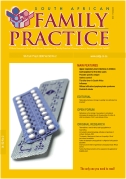Telemedicine – A Need For Ethical And Legal Guidelines in South Africa
Keywords:
ethics, guidelines, telemedicine
Abstract
Background: Telemedicine is viewed as a new way of offering medical services. It is seen as a means of overcoming the growing shortage of health practitioners in developing countries. The aim of this paper is to highlight the need for the formulation of guidelines for the ethical practice of telemedicine in South Africa. Methods: Full-length, peer-reviewed journal papers were obtained for review by searching the electronic databases Pubmed, CINAHL and CAB International, using the Boolean-linked keywords ethics AND telemedicine, ethics AND telecare, ethics AND telehealth, and ethics AND ehealth. Additional searches were made of Google Scholar using the same search strategies, and of the web pages of national telemedicine associations. Results: A total of 152 relevant papers were identified. Twenty-one telemedicine guidelines were obtained. Only four countries and one international association have developed ethical guidelines. Several medical disciplines have established national guidelines for their speciality. Common ethical issues identified include the doctor-patient relationship, informed consent, confidentiality, data security, adequacy of records, data standards and quality, clinical competence, licensure and medical responsibility. These are discussed with reference to the developing world where appropriate. Conclusion: Resource constraints and other issues relevant to developing countries may require the formulation of guidelines that do not necessarily conform with those of the developed world. It is in the interests of patients and practitioners that ethical guidelines for the practice of telemedicine are developed for South Africa. If telemedicine is to be used to overcome shortages of health practitioners, it is important that contentious issues are resolved in a pragmatic way that is appropriate to our circumstances and in the best interests of the majority of our population.
Published
2008-02-28
Section
Original Research
By submitting manuscripts to SAFP, authors of original articles are assigning copyright to the South African Academy of Family Physicians. Copyright of review articles are assigned to the Publisher, Medpharm Publications (Pty) Ltd, unless otherwise specified. Authors may use their own work after publication without written permission, provided they acknowledge the original source. Individuals and academic institutions may freely copy and distribute articles published in SAFP for educational and research purposes without obtaining permission.

